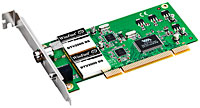Leadtek WinFast DTV2000DS: Difference between revisions
No edit summary |
No edit summary |
||
| Line 6: | Line 6: | ||
Currently supported by recent V4L-DVB (as at Sep 2010). |
Currently supported by recent V4L-DVB (as at Sep 2010). |
||
The card is not working out of the box, however there is a solution (patch |
The card is not working out of the box, however there is a solution (patch to V4L really). |
||
==Overview/Features== |
==Overview/Features== |
||
Revision as of 22:58, 21 November 2010
A dual tuner DVB-T PCI card from Leadtek.
Currently supported by recent V4L-DVB (as at Sep 2010). The card is not working out of the box, however there is a solution (patch to V4L really).
Overview/Features
Formats:
- DVB-T
Inputs:
- RF
- Infrared
Components Used
Contains
- NXP TDA18211
Identification
Output of lsusb -v:
Bus 002 Device 002: ID 0413:6a04 Leadtek Research, Inc.
Device Descriptor:
bLength 18
bDescriptorType 1
bcdUSB 2.00
bDeviceClass 0 (Defined at Interface level)
bDeviceSubClass 0
bDeviceProtocol 0
bMaxPacketSize0 64
idVendor 0x0413 Leadtek Research, Inc.
idProduct 0x6a04
bcdDevice 2.00
iManufacturer 1 Afatech
iProduct 2
iSerial 0
bNumConfigurations 1
Configuration Descriptor:
bLength 9
bDescriptorType 2
wTotalLength 46
bNumInterfaces 1
bConfigurationValue 1
iConfiguration 0
bmAttributes 0x80
(Bus Powered)
MaxPower 500mA
Interface Descriptor:
bLength 9
bDescriptorType 4
bInterfaceNumber 0
bAlternateSetting 0
bNumEndpoints 4
bInterfaceClass 255 Vendor Specific Class
bInterfaceSubClass 0
bInterfaceProtocol 0
iInterface 0
Endpoint Descriptor:
bLength 7
bDescriptorType 5
bEndpointAddress 0x81 EP 1 IN
bmAttributes 2
Transfer Type Bulk
Synch Type None
Usage Type Data
wMaxPacketSize 0x0200 1x 512 bytes
bInterval 0
Endpoint Descriptor:
bLength 7
bDescriptorType 5
bEndpointAddress 0x02 EP 2 OUT
bmAttributes 2
Transfer Type Bulk
Synch Type None
Usage Type Data
wMaxPacketSize 0x0200 1x 512 bytes
bInterval 0
Endpoint Descriptor:
bLength 7
bDescriptorType 5
bEndpointAddress 0x84 EP 4 IN
bmAttributes 2
Transfer Type Bulk
Synch Type None
Usage Type Data
wMaxPacketSize 0x0200 1x 512 bytes
bInterval 0
Endpoint Descriptor:
bLength 7
bDescriptorType 5
bEndpointAddress 0x85 EP 5 IN
bmAttributes 2
Transfer Type Bulk
Synch Type None
Usage Type Data
wMaxPacketSize 0x0200 1x 512 bytes
bInterval 0
Device Qualifier (for other device speed):
bLength 10
bDescriptorType 6
bcdUSB 2.00
bDeviceClass 0 (Defined at Interface level)
bDeviceSubClass 0
bDeviceProtocol 0
bMaxPacketSize0 64
bNumConfigurations 1
Device Status: 0x0000
(Bus Powered)
Making it work in Ubuntu
Updated 20 Nov 2010 by AMX.
Here is a simple HOWTO/Workaround to get this card working . This is based on debian flavours. Although there are some people that have come up with shell scrips and patches to get something similar, it is better that everyone knows how things are done, and also hopefully this will be incorporated into the new releases of V4L. Until then we all have to sweat it a bit!!
The real solution is based on the bug found in http://www.xpmediacentre.com.au/community/tuners/41937-leadtek-dtv2000ds-4.html . There is another issue that better get fixed and it is to do with I2C byte write numbers.
Please leave comments in the discussion session or put comments in http://www.xpmediacentre.com.au/community/tuners/41937-leadtek-dtv2000ds-4.html so that we keep this updated.
1- Starting from a clean install of 10.04 or 10.10, perform the initial steps to install V4L drivers
sudo apt-get install mercurial linux-headers-$(uname -r) build-essential
2- go to http://linuxtv.org/hg/v4l-dvb/rev/abd3aac6644e and click on the "bz2" link and download the file.
(Note that here I am referring to a specifig tag of the repository, i.e. abd3aac6644e.)
3- run
bzcat v4l-dvb-abd3aac6644e.tar.bz2 | tar xv
cd v4l-dvb-abd3aac6644e
This should create a directory called v4l-dvb-abd3aac6644e
4- Do the following modifications
4.1- The small_i2c fix: This fix is from discussions here http://www.spinics.net/lists/linux-usb/msg37741.html .
Edit the file linux/drivers/media/dvb/dvb-usb/af9015.c and replace
static struct tda18271_config af9015_tda18271_config = {
.gate = TDA18271_GATE_DIGITAL,
.small_i2c = 1,
};
with
static struct tda18271_config af9015_tda18271_config = {
.gate = TDA18271_GATE_DIGITAL,
.small_i2c = TDA18271_16_BYTE_CHUNK_INIT,
};
Then edit the file linux/drivers/media/common/tuners/tda18271.h
and replace
enum tda18271_small_i2c {
TDA18271_39_BYTE_CHUNK_INIT = 0,
TDA18271_16_BYTE_CHUNK_INIT = 1,
TDA18271_08_BYTE_CHUNK_INIT = 2,
};
with
enum tda18271_small_i2c {
TDA18271_39_BYTE_CHUNK_INIT = 0,
TDA18271_16_BYTE_CHUNK_INIT = 16,
TDA18271_08_BYTE_CHUNK_INIT = 8,
TDA18271_03_BYTE_CHUNK_INIT = 3,
};
4.2- The main and the nasty bug i.e. the if_sample_freq bug: This fix is from http://www.xpmediacentre.com.au/community/tuners/41937-leadtek-dtv2000ds-4.html .
edit the file linux/drivers/media/dvb/frontends/af9013.c
and replace
/* TDA18271 uses different sampling freq for every bw */
if (state->config.tuner == AF9013_TUNER_TDA18271) {
switch (bw) {
case BANDWIDTH_6_MHZ:
if_sample_freq = 3300000; /* 3.3 MHz */
break;
case BANDWIDTH_7_MHZ:
if_sample_freq = 3800000; /* 3.8 MHz */
break;
case BANDWIDTH_8_MHZ:
default:
if_sample_freq = 4300000; /* 4.3 MHz */
break;
}
}
with
/* TDA18271 uses different sampling freq for every bw */
if (state->config.tuner == AF9013_TUNER_TDA18271) {
switch (bw) {
case BANDWIDTH_6_MHZ:
if_sample_freq = 3300000; /* 3.3 MHz */
break;
case BANDWIDTH_7_MHZ:
if_sample_freq = 3500000; /* 3.5 MHz */
break;
case BANDWIDTH_8_MHZ:
default:
if_sample_freq = 4000000; /* 4.0 MHz */
break;
}
}
5- Compile and install the drivers
make config
sed -i -e "s/FIREDTV=m/FIREDTV=n/" v4l/.config
make
sudo make config
wget http://palosaari.fi/linux/v4l-dvb/firmware/af9015/5.1.0.0/dvb-usb-af9015.fw
sudo cp dvb-usb-af9015.fw /lib/firmware
6- Shutdown (you have to shutdown)
7- Startup
Remote Control Support
I (Gregoryo) have had no success with the remote, but there is hope from dmesg:
[ 22.263721] input: IR-receiver inside an USB DVB receiver as /devices/pci0000:00/0000:00:0e.0/0000:02:0a.2/usb2/2-1/input/input5
user@host:~$ cat /proc/bus/input/devices
I: Bus=0003 Vendor=0413 Product=6a04 Version=0200
N: Name="IR-receiver inside an USB DVB receiver"
P: Phys=usb-0000:02:0a.2-1/ir0
S: Sysfs=/devices/pci0000:00/0000:00:0e.0/0000:02:0a.2/usb2/2-1/input/input5
U: Uniq=
H: Handlers=kbd event5
B: EV=3
B: KEY=108fc310 2802891 0 0 0 0 118000 200180 4803 e1680 0 100000 ffe
So I've been using /dev/input/event5 in my tests. I have tried using evtest, mode2, and irw to no avail. I get no indication of any signal coming from the remote. Am I missing a kernel driver module?

